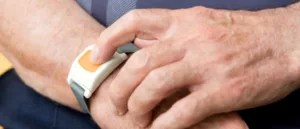Medical alert systems, also known as personalized emergency response systems, are devices that offer seniors the opportunity to safely stay in their homes as they get older. This technology enables them to remain independent, keep their dignity and avoid moving into a long-term care facility.
Unfortunately, trying to keep up with this type of technology can be challenging. Knowing the types of questions to ask before buying an alert system can be even more difficult. This article addresses the questions that seniors and their adult children should ask before they decide to install a medical alert system into the home.
What Range Does the Alert System Have?
You need to know what the range limitations are between the base station and the wearable device for the system you’re considering. Most of the medical alert systems companies on the market provide the same kind of basic hardware. The two main components they provide are (1) a base station that is positioned in the home and (2) a wearable alarm button that is worn on the body. This wearable device can be a pendant necklace, a wrist watch or a belt clip.
The base station can be connected to the home phone system, or it may work on the cellular network. In either case, it’s the base station that calls the medical alert monitoring center when you press your wearable button. The wearable device communicates with the base station wirelessly. Therefore, you need to know what the coverage range is between the base station and the wearable alarm button.
Typically, the range covers the average-sized home and provides about 400 to 600 feet of coverage. After any alert system is installed, test the range inside the house, on the porch and in the yard. Medical alert system companies always welcome and encourage their customers to make test calls.
Must the Alert System Be Professionally Installed or Can I Install It Myself?
Some manufacturers have sales representatives who will install and test the system in the home for you. There is generally an installation fee, but the fee needs to be paid only one time. Be sure to ask how much the fee is in advance.
If they mail the device to you for self-installation, be sure that directions for installation are also included. There should also be a phone number, and online support contact information included so you can communicate with the company if you need assistance with the setup and testing. It’s important that you test the alert system before you begin wearing the device to make sure it works right.
Where is the Call Center Located?
This is somewhat of a loaded question. Outsourcing is a very popular way for businesses to contract job duties while saving money. The call center could be located anywhere, although most U.S.-based customers appreciate a business that employs people who live in the United States. Just about every medical alert company will let you know where their monitoring centers are located. The main thing to keep in mind is how responsive the customer support is.
• Is the customer support friendly and helpful?
• How quickly do they respond to calls?
• Is customer support available at any time of the day or night?
• Is the customer support knowledgeable about the product?
• Is the customer support trained to understand the concerns of seniors?
Can the Alert System Detect a Fall?
Emergency alert system technology has advanced over the past decade. The advanced systems of today can automatically detect when a user has fallen. Engineers have developed advanced algorithms, and thus, the components of these systems are now embedded with ‘smart systems’ that can actually tell the difference between when someone has fallen and when they’ve simply sat down very quickly.
Can the System be Used Away from Home?
Not only can you feel confident that you or your loved one can get help if they have an emergency at home, but now they can get the same fast assistance when they’re away from home thanks to mobile medical alert systems. Most of these devices have built-in GPS capabilities, so medical responders can find the person in need of help without delay wherever they are. GPS medical alert systems are also an excellent choice if your loved one enjoys going out on their own but is concerned they may become confused or lost while away from home.
Having personal emergency alert systems in the home is key to helping seniors live independently in their homes and on the go. When you choose the right system, you’ll be confident that your loved one can get help whenever they need it.








